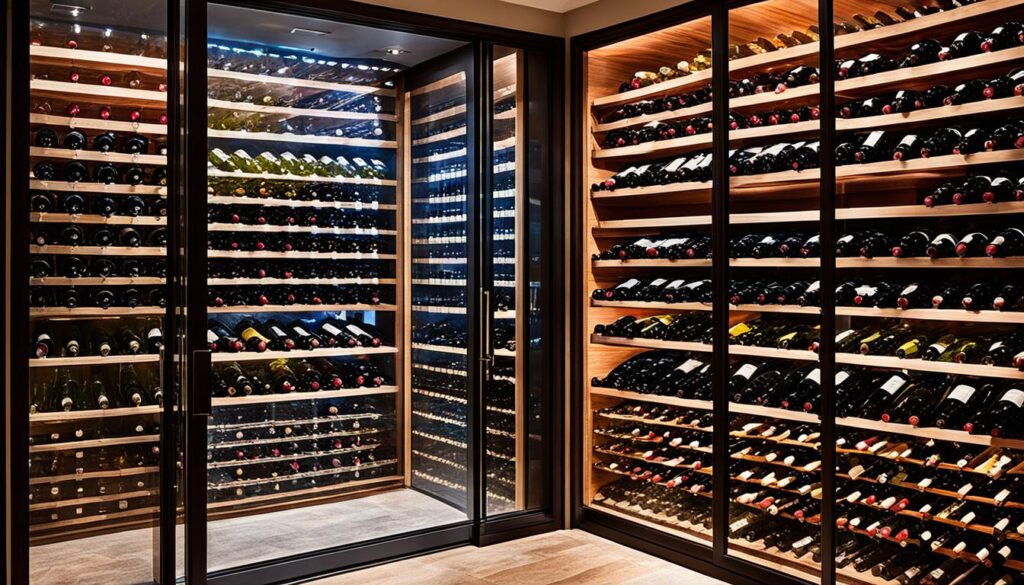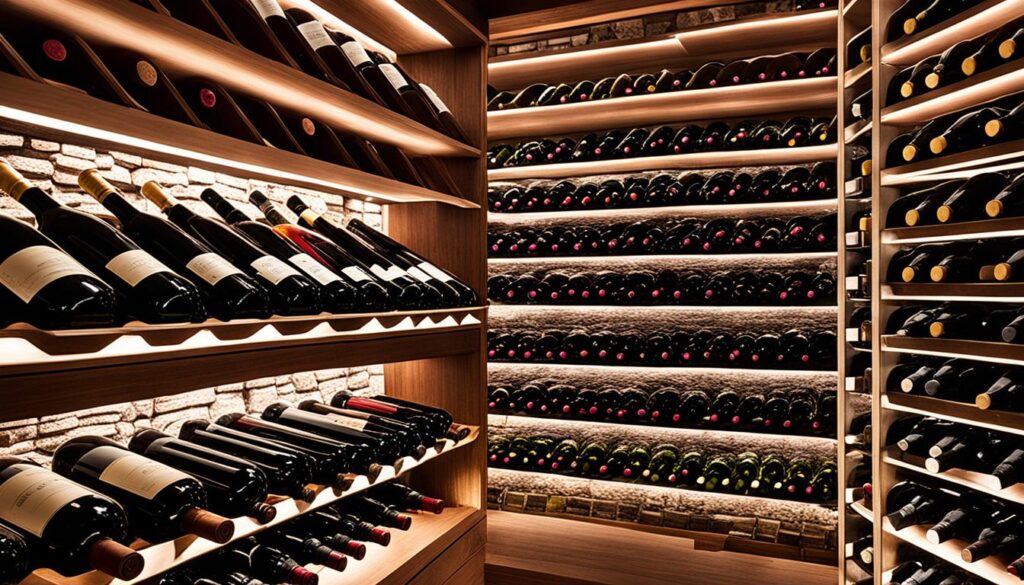Wine collectors understand the value and delicate nature of their prized possessions. Whether they are rare vintages passed down through generations or carefully curated selections of fine wines, these collections represent both sentimental and financial investments. With the ever-present risks of damage, theft, and spoilage, it is crucial for wine collectors to secure the right insurance coverage.
Fine wine insurance provides comprehensive protection for wine collectors, covering their collections in various settings. Whether it’s a home cellar, a storage facility, during transit, or on display, insurance policies ensure that the collection is safeguarded.
Damage coverage is an essential part of wine insurance, protecting against natural disasters, fire, water damage, theft, and spoilage due to equipment failure. These policies are designed to cater to the unique needs of wine collectors and provide financial compensation for the loss of valuable and irreplaceable bottles.
While an average bottle of wine may cost just $20 at a local shop, the value of collectible wines can reach staggering amounts. For example, a bottle of 1982 Lafite Rothschild starts at about $8,000 at Sotheby’s Wine Auction, and a 1959 Romanée-Conti costs over $18,000. With such significant investments, choosing the right wine insurance policy becomes crucial for serious collectors.

Key Takeaways: Fine Wine Insurance
- Fine wine insurance provides comprehensive coverage for wine collectors, protecting against damage, theft, and spoilage.
- Policies cover wine in various settings, including home cellars, storage facilities, during transit, and on display.
- Damage coverage includes protection from natural disasters, fire, water damage, theft, and spoilage due to equipment failure.
- Collectible wines can have astronomical values, making the right wine insurance policy a necessity for serious collectors.
- Obtaining insurance ensures peace of mind and protection for wine collections, both sentimentally and financially.
Benefits of Wine Insurance
Wine insurance is a valuable asset for collectors, providing essential protection against financial losses resulting from damage, theft, and spoilage. Whether you have a small collection or an extensive cellar, wine insurance can offer peace of mind and security for your valuable investment.
Also Read : Protecting Your Care Home: Adult Residential Facility Insurance Solutions
One of the key benefits of wine insurance is the range of coverage options it provides. Policies can be tailored to suit your specific needs, offering comprehensive protection for your collection. These coverage options ensure that you are adequately compensated for any financial losses incurred due to unforeseen circumstances.
Also Read : Exploring Types Of Equipment Breakdown Insurance
Claims processing is also a crucial aspect to consider when choosing a wine insurance policy. Efficient claims processing ensures that you receive swift and fair compensation for any covered losses. With the right policy, you can have confidence that your claims will be handled professionally and promptly, minimizing any disruptions to your collecting journey.
Also Read : Protecting Your Belongings: Self-Storage Tenant Insurance Explained
Furthermore, many wine insurance policies offer add-ons for spoilage and spillage. These additional coverage options can be invaluable in safeguarding your collection against accidents or incidents that may result in the deterioration or loss of your precious wines. By including these add-ons in your policy, you can enhance the level of protection and coverage offered.
Also Read : Exploring Types Of Equipment Breakdown Insurance
Consider the following benefits of wine insurance:
- Protection against financial losses from damage, theft, and spoilage
- A range of coverage options to suit your specific needs
- Efficient claims processing for swift and fair compensation
- Add-ons for spoilage and spillage to enhance coverage
“Wine insurance not only provides financial security but also offers collectors peace of mind, knowing that their valuable investment is protected from unforeseen circumstances.” – Wine Enthusiast
| Benefits of Wine Insurance | Description |
|---|---|
| Financial Loss Protection | Insurance safeguards against financial losses resulting from damage, theft, and spoilage. |
| Coverage Options | A wide range of coverage options are available, allowing collectors to customize their policies to suit their specific needs. |
| Efficient Claims Processing | Insurance providers ensure that claims are processed efficiently, minimizing disruptions and delays. |
| Add-Ons for Spoilage and Spillage | Policies may offer additional coverage options for spoilage and spillage incidents. |
As a wine collector, it is essential to protect your valuable investment. Wine insurance offers comprehensive coverage, efficient claims processing, and valuable add-ons for spoilage and spillage incidents. By securing the right policy, you can enjoy peace of mind and confidently continue building your remarkable collection.
Also Read : Protecting Your Belongings: Self-Storage Tenant Insurance Explained
Types of Wine Insurance
Wine insurance policies offer various levels of coverage to cater to the specific needs of collectors. Understanding the different types of coverage available can help wine enthusiasts make informed decisions when selecting a policy. Common types of wine insurance include:
1. Damage Coverage
Damage coverage protects against financial losses resulting from unexpected accidents or incidents that can damage a wine collection. This type of coverage provides reimbursement for repairs or replacement of damaged bottles due to events such as natural disasters, fire, and water damage. It ensures that collectors are not left financially burdened by unforeseen circumstances.
2. Theft Coverage
Theft coverage safeguards collectors from the unfortunate event of stolen wine. It provides financial compensation for the value of the stolen bottles, offering peace of mind and protection against the irreparable loss of a prized collection. With theft coverage, wine enthusiasts can rest assured knowing that their investments are well-protected.
3. Spoilage Coverage
Spoilage coverage is essential for protecting wine collections from issues such as temperature fluctuations or equipment failures that can lead to spoilage or deterioration. This coverage reimburses collectors for the value of spoiled bottles, ensuring that they do not suffer financial losses due to factors beyond their control.
4. Transit Coverage
Transit coverage provides protection during the transportation of wine from one location to another. Whether collectors are shipping wine to a wine auction, sending bottles to a storage facility, or moving their collection across long distances, transit coverage ensures that their investment is safe. It covers potential damages or losses that may occur during transit.
Having a comprehensive wine insurance policy that combines various types of coverage ensures that collectors are fully protected against all possible risks to their wine collections.

| Types of Wine Insurance | Coverage Provided |
|---|---|
| Damage Coverage | Protection against unexpected accidents or incidents |
| Theft Coverage | Financial compensation for stolen bottles |
| Spoilage Coverage | Reimbursement for the value of spoiled bottles |
| Transit Coverage | Protection during transportation of wine |
Additional Coverage Options
When it comes to wine insurance, collectors have the option to go beyond basic coverage. Insurance policies can offer additional coverage options to provide further protection for your valuable wine collection. These additional coverages include:
Replacement-Cost Coverage
Replacement-cost coverage ensures that in the event of a covered loss, you will be reimbursed for the current market value of your wine. This coverage takes into account the current market prices for wines of similar quality and rarity, allowing you to replace your lost bottles with comparable ones.
Agreed-Value Coverage
Agreed-value coverage allows you to establish a specific value for your wine collection at the time the policy is written. In the event of a covered loss, you will be reimbursed for the agreed-upon value, providing peace of mind that your collection is fully protected.
Collectible Components Coverage
For collectors with valuable wine accessories and equipment such as decanters, wine glasses, and cellar management software, collectible components coverage can be added to your policy. This ensures that if these items are damaged, lost, or stolen, you will be compensated.
Worldwide Coverage
Worldwide coverage extends the protection of your wine collection beyond your home. Whether you’re traveling with your wines or have an off-site storage facility, this coverage ensures that your collection is covered no matter where it is located.
Auction and Display Coverage
If you frequently participate in wine auctions or display your collection at events, auction and display coverage can provide added protection. This coverage extends to potential risks associated with transportation, exhibition, and public display, safeguarding your collection during these activities.
By choosing additional coverage options, collectors can customize their wine insurance policies to suit their unique needs and preferences. These options provide an extra layer of protection for your valuable wine collection.

Determining the Need for Wine Insurance
When considering whether wine insurance is necessary, it is important to assess various factors, including the value of the collection, storage conditions, and the level of sentimental and financial incentive.
For the average consumer with a small wine collection, the need for wine insurance may not be a top priority. However, for those who have invested significant time and money into building their collections, insurance coverage can provide valuable protection.
One crucial consideration is the presence of climate-controlled cellars. Wine collectors who have dedicated cellars with precise temperature and humidity control are more likely to have higher-value collections. The consistent conditions in climate-controlled environments reduce the risk of damage and spoilage.
“A well-invested wine cellar is both a sentimental and a financial asset,” says Marcus Bowman, a wine collector with over 20 years of experience. “If you’ve spent years curating your collection, ensuring its protection is a wise decision.”
Additionally, those who have inherited collections face unique circumstances. Inherited collections often have significant sentimental value and may already have a considerable collection value. Ensuring the protection of these inherited collections can provide reassurance and preserve their sentimental and financial worth for future generations.
Even for collectors who do not have large cellars or inherited collections, the financial incentive to protect their investment should not be overlooked. While individual bottles may vary in price, the overall collection value can quickly add up. A single rare vintage may be worth thousands, and the cumulative value of an extensive collection can reach staggering figures. Having adequate insurance coverage safeguards against potential financial losses in the event of damage, theft, or spoilage.
In conclusion, while the average consumer with a small wine collection may not require wine insurance, those with climate-controlled cellars or inherited collections should seriously consider it due to the higher value and potential risks involved. Protecting both the sentimental and financial incentive of a wine collection is key to ensuring peace of mind for collectors.
Factors to Consider When Choosing Wine Insurance
When selecting a wine insurance policy, there are several factors to consider that can impact the coverage and overall protection of your valuable wine collection. It’s important to carefully evaluate these factors to ensure you make an informed decision.
Coverage Limits
One of the key considerations is the coverage limits provided by the insurance policy. Coverage limits determine the maximum amount that the insurer will pay in the event of a claim. Evaluate your collection’s value and ensure that the policy’s coverage limits adequately protect your investment.
Deductibles
Deductibles are the out-of-pocket expense you must pay before the insurance coverage kicks in. Consider the deductibles offered by different policies and choose one that aligns with your risk tolerance and budget. Higher deductibles may result in lower premiums but could require greater financial obligations in the event of a claim.
Exclusions
Exclusions are specific scenarios or circumstances that your insurance policy may not cover. Carefully review the list of exclusions to ensure that it doesn’t include any risks that are relevant to your collection. Common exclusions may include damages caused by natural disasters, improper storage, or certain types of transportation.
Provider Reputation
The reputation of the insurance provider is crucial when selecting a policy. Research and check for reviews or ratings of the insurance company to ensure its reliability and financial stability. Look for a provider with a strong track record of serving wine collectors and processing claims promptly and efficiently.
Premium Costs
Premium costs are a significant consideration when choosing a wine insurance policy. Compare premium rates from different insurance providers and evaluate how well the premiums align with the coverage and benefits offered. Keep in mind that while lower premiums may be tempting, they could indicate less coverage or more restrictions.
By carefully considering these factors, you can select a wine insurance policy that provides adequate coverage, suits your budget, and aligns with your collection’s value and unique needs.
Cost of Wine Insurance
When it comes to wine insurance, one of the key considerations for collectors is the cost of premiums. The premiums for wine insurance can vary based on several factors, including the value of the collection and the level of risk associated with it.
Factors Affecting Cost
There are various factors that can affect the cost of wine insurance premiums. These factors take into account the unique characteristics and circumstances of each wine collection. By understanding these factors, collectors can be better prepared to assess the cost of their insurance policies.
- Collection’s Value: The overall value of the collection plays a significant role in determining the premium cost. As the value of the collection increases, the insurance coverage required also increases, which in turn affects the premium.
- Frequency of Movement: The frequency at which the wine collection is moved or transported can impact the premium. Collections that are frequently transported may have a higher risk of damage or theft, resulting in higher premiums.
- Storage Conditions: The conditions in which the wine collection is stored can influence the cost of premiums. Proper climate-controlled storage facilities reduce the risk of spoilage and damage, leading to lower premiums.
- Location: The location of the collection can affect the premium cost. High-risk areas prone to natural disasters or with a higher incidence of theft may lead to higher premiums.
Sample Table: Factors Affecting Premium Costs
| Factor | Influence on Premium Cost |
|---|---|
| Collection’s Value | Directly proportional |
| Frequency of Movement | Directly proportional |
| Storage Conditions | Inversely proportional |
| Location | Varies based on risk level |

By considering these factors and working with a reputable wine insurance provider, collectors can find an insurance policy that offers the right coverage at a competitive premium cost. It’s important to evaluate the specific needs of the wine collection and select a policy accordingly.
Insuring a Wine Collection
Insuring a wine collection requires careful consideration and thorough preparation. Whether you have a small assortment or an extensive cellar, taking the necessary steps to protect your investment is crucial. Here are the essential aspects to keep in mind when insuring your wine collection:
1. Inventory
Before insuring your collection, it’s important to create a detailed inventory. This includes documenting the wines you own, their vintages, and their estimated values. By keeping an accurate inventory, you can provide the necessary information to your insurance provider and ensure proper coverage.
2. Appraisal
In some cases, obtaining professional appraisals may be necessary, especially for rare and valuable bottles. A certified wine appraiser can accurately assess the worth of your collection, providing you with the documentation needed for insurance purposes. This appraisal will help determine the appropriate coverage to safeguard your investment.
3. Comparing Quotes
When it comes to insuring your wine collection, it’s wise to gather quotes from different insurers to compare coverage options and premiums. This allows you to choose a policy that aligns with your specific needs and budget. Consider factors such as coverage limits, deductibles, and exclusions when evaluating different quotes.
“Comparing quotes from multiple insurers gives you a better understanding of the available coverage options. Don’t forget to review the policy details carefully to ensure the scope of coverage aligns with the value and unique aspects of your collection.”
4. Policy Documents
Once you have selected an insurance provider and policy, it is crucial to keep your policy documents safe and up to date. Store them in a secure location, such as a safe or digital cloud storage, to protect against loss or damage. Regularly review your policy to ensure it reflects any changes in your collection’s value or storage arrangement.
By taking these steps and being diligent in your approach, you can effectively insure your wine collection. Remember, proper insurance coverage provides peace of mind and financial protection for your valuable and cherished wines.
Now that we have discussed the process of insuring a wine collection, let’s explore the next section: Filing a Wine Insurance Claim.
Filing a Wine Insurance Claim
When it comes to safeguarding your valuable wine collection, having wine insurance in place is crucial. But what should you do if the unexpected happens and you need to file a claim?
The first step is to contact the insurance company immediately. Notify them of the damage or theft and provide all the necessary details about the incident. The sooner you get in touch with them, the sooner they can start the claims process and assist you.
Next, document the damage or theft thoroughly. Take clear and detailed photos of the affected bottles or storage area to ensure all the necessary evidence is captured. This documentation will help support your claim and provide the insurance company with a clear understanding of the extent of the damage.
If the theft involved a criminal act, it is advisable to obtain a police report. This official document will serve as proof of the incident and further strengthen your claim. Contact your local law enforcement agency to report the theft and request a copy of the report for your insurance company.
Additionally, it is essential to keep records of all claim-related expenses. This includes any costs incurred for repairs, replacements, or other necessary actions taken to mitigate the damage or loss. Ensure you retain all receipts, invoices, and other relevant documents for these expenses.
Contact the insurance company immediately, document the damage or theft thoroughly, obtain a police report if necessary, and keep records of all claim-related expenses.
By following these steps, you can help streamline the claims process and increase the chances of a successful resolution. Remember, timely communication, strong documentation, and accurate record-keeping are key when filing a wine insurance claim.

Homeowners Insurance and Wine Coverage
While homeowners insurance provides coverage for a wide range of risks, it may not adequately protect your valuable wine collection. Most standard homeowners insurance policies have limitations and exclusions when it comes to specialized items like fine wines. Therefore, it is crucial to consider obtaining specialized wine insurance to ensure comprehensive coverage for your collection.
Specialized wine insurance offers broader protection specifically designed for the unique risks associated with wine collections. These policies provide coverage for damage, theft, spoilage, and other unforeseen circumstances that could result in financial losses for wine collectors.
By obtaining specialized wine insurance, you can have peace of mind knowing that your valuable wine collection is adequately protected. These policies often offer higher coverage limits and additional features specifically tailored to the needs of wine collectors.
“Having specialized wine insurance allows you to enjoy your collection without worrying about the potential financial losses that could occur. It offers comprehensive coverage for your valuable wines, offering protection in case of damage, theft, or spoilage.” – Wine connoisseur Eric Johnson
Key Benefits of Specialized Wine Insurance:
- Broader coverage for damage, theft, and spoilage
- Higher coverage limits tailored to the value of your collection
- Specialized claims processing for wine-related incidents
- Expert knowledge and understanding of the wine market
- Additional features such as worldwide coverage and protection during transit
It is important to note that while some homeowners insurance policies may offer limited coverage for wine collections as part of their personal property coverage, the protection provided may not be sufficient to cover the full value of your collection. Specialized wine insurance is specifically designed to address the unique risks associated with wine and is recommended for wine collectors looking for comprehensive coverage.
When considering insurance options for your fine wine collection, it is advisable to consult with insurance professionals who specialize in wine insurance. They can guide you through the process of selecting a policy that meets your specific needs and offers the necessary protection for your valuable collection.
Next, we will explore the options available for insuring whiskey collections and the specialized insurance providers in that domain.
| Homeowners Insurance | Specialized Wine Insurance |
|---|---|
| May offer limited coverage | Comprehensive coverage for wine collections |
| Exclusions and limitations for specialized items | Specifically designed for the unique risks associated with wine |
| May not cover the full value of the collection | Higher coverage limits tailored to the value of the collection |
| Standard claims process | Specialized claims processing for wine-related incidents |

Wine Insurance for Whiskey Collections
While wine collections are often the focus of insurance discussions, it’s important to note that whiskey collections can also be insured. Whiskey enthusiasts and collectors who have invested in rare and valuable bottles can protect their prized possessions with specialized whiskey insurance policies.
Also Read:- The Weirdest Reasons Americans Have Taken Out Personal Loans
Reputable insurance providers like Horton and Woodruff Sawyer offer specialized coverage tailored to the unique needs of whiskey collectors. These policies provide financial protection in the event of damage, theft, and other unforeseen circumstances that may jeopardize the value and integrity of the collection.
Why Consider Specialized Whiskey Insurance?
There are several reasons why whiskey collectors should consider specialized insurance for their valuable collections:
- Protecting your investment: Whiskey collections can accumulate significant value over time, and insuring them ensures that your investment is safeguarded against potential financial losses.
- Coverage for damage and theft: Specialized whiskey insurance provides coverage for accidental damage, breakage, and theft, giving collectors peace of mind knowing that their prized bottles are protected.
- Expert knowledge: Insurance providers specializing in whiskey collections understand the unique risks and challenges associated with whiskey storage and transportation, allowing them to offer tailored coverage to meet collectors’ needs.
- Claims expertise: In the unfortunate event of a loss or damage to your whiskey collection, specialized insurance providers have the expertise to handle claims efficiently and ensure a fair and satisfactory resolution.
Whether you’re a seasoned whiskey collector or just starting your journey, specialized whiskey insurance can provide the financial protection and peace of mind you need to fully enjoy and preserve your valuable collection.
Conclusion
In conclusion, wine insurance provides invaluable protection and peace of mind for collectors, safeguarding against financial losses from damage, theft, and spoilage. With the right policy in place, you can confidently protect your wine collection and ensure its continued value and enjoyment.
When considering wine insurance, it is crucial to choose the policy that best meets your needs. Carefully evaluate coverage options, deductibles, and exclusions to ensure comprehensive protection for your collection. By documenting your collection and keeping your policy up to date, you can streamline the claims process and maximize coverage.
Don’t leave the fate of your valuable wines to chance. Invest in wine insurance to protect your collection and enjoy the peace of mind that comes with knowing your investment is secure.
FAQs
A: Wine collection insurance is a specialized insurance policy that provides coverage for your valuable wine and spirits against risks such as damage, theft, or breakage.
Q: Why should I consider wine collection insurance?
A: Wine collection insurance is important to protect your fine wine collection, especially if it holds significant value. It provides peace of mind knowing that your investment is covered in case of unexpected events.
Q: What does wine collection insurance typically cover?
A: Wine collection insurance typically covers risks such as accidental breakage, theft, power outages affecting climate control, and mechanical breakdown of storage equipment.
Q: How do I determine the value of my wine collection for insurance purposes?
A: To determine the value of your wine collection for insurance purposes, you should itemize each bottle or provide an appraisal from a professional wine appraiser.
Q: Can I insure my wine collection under my home insurance policy?
A: While some home insurance policies may offer limited coverage for wine collections, it is recommended to purchase a specialized wine collection insurance policy for comprehensive coverage.
Q: What is blanket coverage in wine collection insurance?
A: Blanket coverage in wine collection insurance is when the entire collection is covered under a single policy without the need to itemize each bottle separately.
Q: How can I protect my fine wine collection with insurance?
A: You can protect your fine wine collection by purchasing a wine collection insurance policy from reputable insurers like Chubb or other wine insurers who offer tailored insurance programs for wine collectors.
Source Links
- https://www.investopedia.com/how-to-insure-wine-7970439
- https://www.chubb.com/us-en/individuals-families/products/valuables/wine-spirits.html
- https://newagencypartners.com/wine-infographic/

